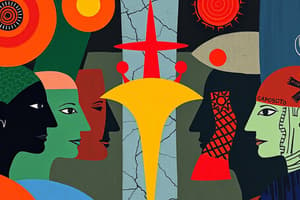Podcast
Questions and Answers
What are horticultural and pastoral societies characterized by?
What are horticultural and pastoral societies characterized by?
- Domestication of animals and use of hand tools (correct)
- Global trade and market economies
- Urbanization and high population density
- Advanced technology and industrialization
Which type of society uses advanced technology and industrialization?
Which type of society uses advanced technology and industrialization?
- Industrial (correct)
- Hunting and Gathering
- Postindustrial
- Agricultural
What term is associated with the sociologist Emile Durkheim?
What term is associated with the sociologist Emile Durkheim?
- Social facts (correct)
- Alienation
- Class struggle
- Rationalization
What is a characteristic feature of horticultural and pastoral societies?
What is a characteristic feature of horticultural and pastoral societies?
Which type of society is primarily concerned with the production of goods through mechanization?
Which type of society is primarily concerned with the production of goods through mechanization?
In what type of society are material surpluses most likely to develop?
In what type of society are material surpluses most likely to develop?
Which of the following best describes the role of technology in postindustrial societies?
Which of the following best describes the role of technology in postindustrial societies?
Which sociologist is known for their analysis of history and class struggles?
Which sociologist is known for their analysis of history and class struggles?
What is a primary characteristic that differentiates horticultural societies from hunting and gathering societies?
What is a primary characteristic that differentiates horticultural societies from hunting and gathering societies?
Which of the following is NOT a type of society categorized in sociocultural evolution?
Which of the following is NOT a type of society categorized in sociocultural evolution?
Which sociological perspective emphasizes the importance of understanding human behavior through the subjective meanings individuals attach to their actions?
Which sociological perspective emphasizes the importance of understanding human behavior through the subjective meanings individuals attach to their actions?
In terms of sociocultural evolution, which type of society is characterized by the reliance on heavy machinery for increased production?
In terms of sociocultural evolution, which type of society is characterized by the reliance on heavy machinery for increased production?
What does Karl Marx identify as a significant issue within society that leads to conflicts?
What does Karl Marx identify as a significant issue within society that leads to conflicts?
Flashcards are hidden until you start studying
Study Notes
Defining Society
- Society refers to a structured community of people who share a common culture and social institutions.
Sociocultural Evolution
- Sociocultural evolution describes the process of societal development influenced by cultural and social factors.
Types of Societies
- There are several types of societies, each characterized by distinct social structures and ways of life.
Hunting and Gathering
- Represents the earliest form of society, relying on foraging and hunting for subsistence.
Horticultural and Pastoral
- Characterized by the domestication of animals and cultivation of plants using hand tools.
- Utilization of hoes and digging sticks enables groups to cultivate food sources over time.
- In regions where agriculture is challenging, societies often rely more on domesticated animals for sustenance.
- Material surpluses emerge within certain groups, facilitating trade and social stratification.
Agricultural
- Advances in technology and methods lead to large-scale farming, enhancing food production capacity and supporting larger populations.
Industrial
- Marked by a shift to mechanization, increasing productivity and urbanization, leading to changes in labor and social structures.
Postindustrial
- Focuses on the economy based on services and information technology rather than manufacturing and agriculture.
Key Thinkers in Sociology
- Karl Marx: Explored history with emphasis on class struggles, economic factors, and the concept of alienation in industrial societies.
- Emile Durkheim: Studied social facts and their impact on human behavior, promoting the understanding of society's structure.
- Max Weber: Introduced concepts like Verstehen (understanding) and the Ideal Type, emphasizing rationalization in social actions.
Defining Society
- Society refers to a structured community of people who share a common culture and social institutions.
Sociocultural Evolution
- Sociocultural evolution describes the process of societal development influenced by cultural and social factors.
Types of Societies
- There are several types of societies, each characterized by distinct social structures and ways of life.
Hunting and Gathering
- Represents the earliest form of society, relying on foraging and hunting for subsistence.
Horticultural and Pastoral
- Characterized by the domestication of animals and cultivation of plants using hand tools.
- Utilization of hoes and digging sticks enables groups to cultivate food sources over time.
- In regions where agriculture is challenging, societies often rely more on domesticated animals for sustenance.
- Material surpluses emerge within certain groups, facilitating trade and social stratification.
Agricultural
- Advances in technology and methods lead to large-scale farming, enhancing food production capacity and supporting larger populations.
Industrial
- Marked by a shift to mechanization, increasing productivity and urbanization, leading to changes in labor and social structures.
Postindustrial
- Focuses on the economy based on services and information technology rather than manufacturing and agriculture.
Key Thinkers in Sociology
- Karl Marx: Explored history with emphasis on class struggles, economic factors, and the concept of alienation in industrial societies.
- Emile Durkheim: Studied social facts and their impact on human behavior, promoting the understanding of society's structure.
- Max Weber: Introduced concepts like Verstehen (understanding) and the Ideal Type, emphasizing rationalization in social actions.
Defining Society
- Society refers to a structured community of people who share a common culture and social institutions.
Sociocultural Evolution
- Sociocultural evolution describes the process of societal development influenced by cultural and social factors.
Types of Societies
- There are several types of societies, each characterized by distinct social structures and ways of life.
Hunting and Gathering
- Represents the earliest form of society, relying on foraging and hunting for subsistence.
Horticultural and Pastoral
- Characterized by the domestication of animals and cultivation of plants using hand tools.
- Utilization of hoes and digging sticks enables groups to cultivate food sources over time.
- In regions where agriculture is challenging, societies often rely more on domesticated animals for sustenance.
- Material surpluses emerge within certain groups, facilitating trade and social stratification.
Agricultural
- Advances in technology and methods lead to large-scale farming, enhancing food production capacity and supporting larger populations.
Industrial
- Marked by a shift to mechanization, increasing productivity and urbanization, leading to changes in labor and social structures.
Postindustrial
- Focuses on the economy based on services and information technology rather than manufacturing and agriculture.
Key Thinkers in Sociology
- Karl Marx: Explored history with emphasis on class struggles, economic factors, and the concept of alienation in industrial societies.
- Emile Durkheim: Studied social facts and their impact on human behavior, promoting the understanding of society's structure.
- Max Weber: Introduced concepts like Verstehen (understanding) and the Ideal Type, emphasizing rationalization in social actions.
Studying That Suits You
Use AI to generate personalized quizzes and flashcards to suit your learning preferences.




